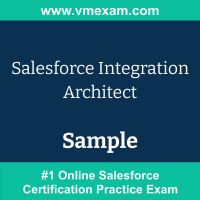01. A customer is evaluating the Platform Events solution and would like help in comparing/contrasting it with Outbound Messaging for real-time/near-real time needs. They expect 3,000 customers to view messages in Salesforce.
Which three considerations should be evaluated and highlighted when deciding between the solutions?
Choose 3 answers
a) Number of concurrent subscribers to Platform Events is capped at 2,000. An Outbound Messaging configuration can pass only 100 notifications in a single message to a SOAP end point.
b) Both Platform Events and Outbound Messaging offer declarative means for asynchronous near-real time needs. They aren't best suited for real-time integrations.
c) In both Platform Events and Outbound Messaging, the event messages are retried by and delivered in sequence, and only once. Salesforce ensures there is no duplicate message delivery.
d) Message sequence is possible in Outbound Messaging, but not guaranteed with Platform Events. Both offer very high reliability. Fault handling and recovery are fully handled by Salesforce.
e) Both Platform Events and Outbound Messaging are highly scalable. However, unlike Outbound Messaging, only Platform Events have Event Delivery and Event Publishing limits to be considered.
02. Service Agents at Northern Trail Outfitters uses Salesforce to manage cases and B2C Commerce for ordering. Which integration solution should an architect recommend in order for the service agents to see order history from a B2C Commerce system?
a) Salesforce B2C Commerce to Service Cloud Connector
b) A REST API offered by Commerce Platform
c) Mulesoft Anypoint Platform
d) REST API offered by Salesforce Platform
03. A Salesforce customer is planning to roll out Salesforce for all their Sales and Service staff. Senior Management has requested that monitoring is to be in pla for Operations to notify any degradation in Salesforce performance.
How should an integration consultant implement monitoring?
a) Request Salesforce to monitor the Salesforce instance and notify when there is degradation in performance.
b) Use APIEVENT to track all user initiated API calls through SOAP, REST or BULK APIs.
c) Use Salesforce limits API to capture current API usage and configure alerts for monitoring.
d) Identify critical business processes and establish automation to monitor performance against established benchmarks.
04. Northern Trail Outfitters (NTO) has recently implemented middleware for orchestration of services across platforms. The ERP system being used requires transactions be captured near real time at a REST endpoint initiated in Salesforce when creating an order object.
Additionally, the Salesforce team has limited development resources and requires a low code solution. Which two options will fulfill the use case requirements?
Choose 2 answers
a) Use Remote Process Invocation fire and forget pattern on insert on the order object using Flow Builder.
b) Use a process builder to create a Platform Event, selecting the record type as the Platform Event Name on insert of record.
c) Implement a Workflow Rule with Outbound Messaging to send SOAP messages to the designated endpoint.
d) Implement Change Data Capture on the order object and leverage the replay Id in the middleware solution.
05. Which of the following is a functional requirement for integrating a new HR management system into an existing system landscape?
a) Ensuring compliance with data privacy regulations
b) Providing real-time data analytics
c) Offering customizable reporting options
d) Providing mobile access to system features
06. The Sales Operations team at Northern Trail Outfitters imports new leads each day. An integrated legacy territory management system assigns territories to leads before Sales team members can work on them. The current integration often experiences latency issues.
Which two recommendations should an Architect make to improve the integration performance?
Choose 2 answers
a) Reduce batch size of asynchronous BULK API.
b) Legacy system should submit in parallel mode.
c) Legacy system should submit in serial mode.
d) Reduce batch size of synchronous BULK API.
07. An Architect is required to integrate with an External Data Source via a Named Credential with an Apex callout due to technical constraints. How is authentication achieved?
a) Handle authentication with login flows.
b) Handle authentication in the code.
c) Connect via Salesforce Connect.
d) Connect via Communities.
08. What is a key consideration in building a resilient integration solution?
a) Infrequent system updates
b) Reducing the need for performance monitoring
c) Consistent and timely error handling
d) Ignoring failed integrations
09. Which two requirements should the Salesforce Community Cloud support for self-registration and SSO?
Choose 2 answers
a) OpenId Connect Authentication Provider and just-in-time provisioning
b) SAML SSO and Registration Handler
c) SAML SSO and just-in-time provisioning
d) OpenId Connect Authentication Provider and Registration Handler
10. What is the best way to handle a failed integration?
a) Notify upper management and wait for further instructions
b) Immediately restore the system to its last working state
c) Ignore the issue and hope it resolves itself
d) Investigate the root cause of the issue and determine a plan of action
 We have prepared Salesforce Integration Architect certification sample questions to make you aware of actual exam properties. This sample question set provides you with information about the Salesforce Integration Architect exam pattern, question formate, a difficulty level of questions and time required to answer each question. To get familiar with Salesforce Certified Integration Architect exam, we suggest you try our Sample Salesforce Integration Architect Certification Practice Exam in simulated Salesforce certification exam environment.
We have prepared Salesforce Integration Architect certification sample questions to make you aware of actual exam properties. This sample question set provides you with information about the Salesforce Integration Architect exam pattern, question formate, a difficulty level of questions and time required to answer each question. To get familiar with Salesforce Certified Integration Architect exam, we suggest you try our Sample Salesforce Integration Architect Certification Practice Exam in simulated Salesforce certification exam environment.